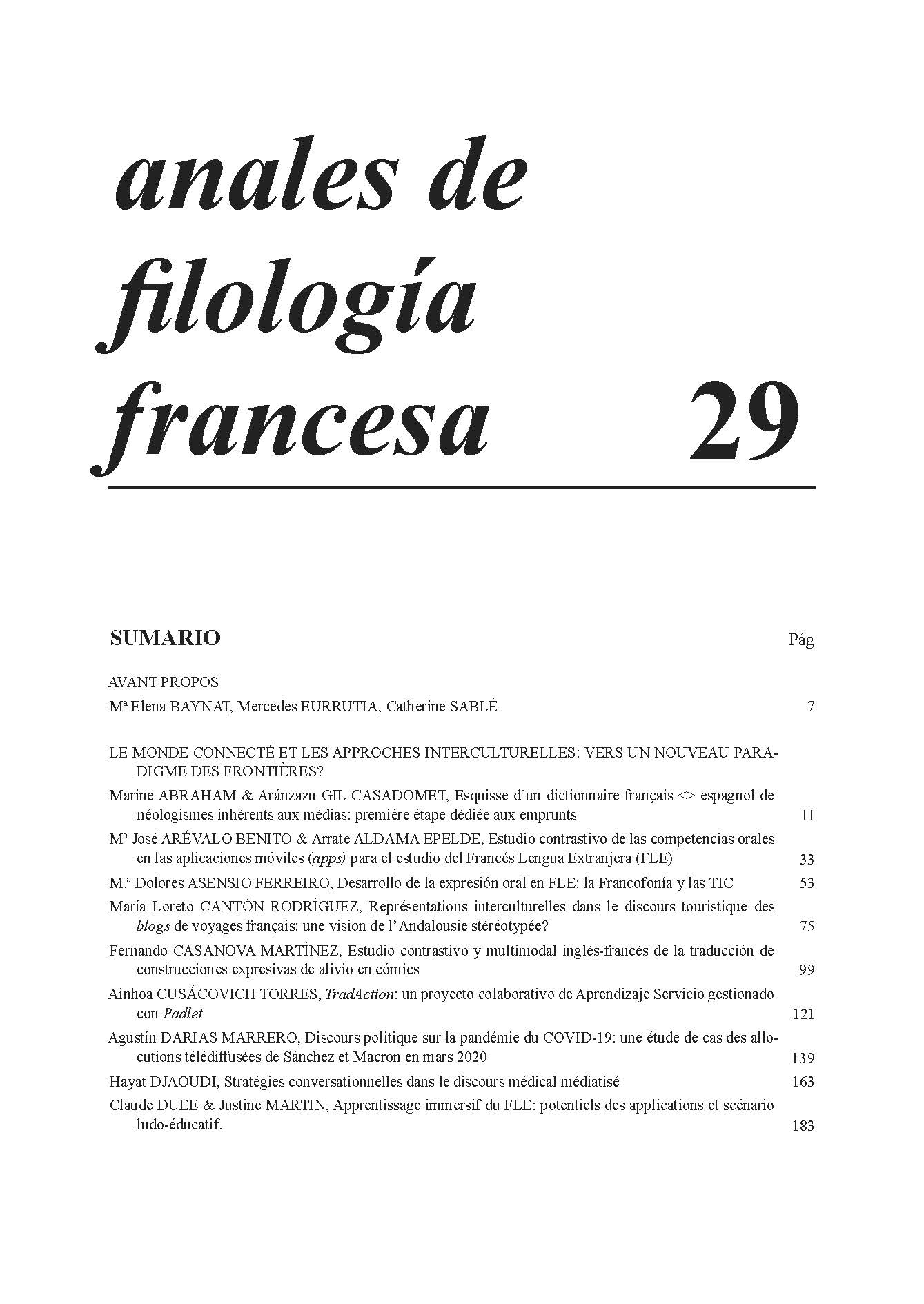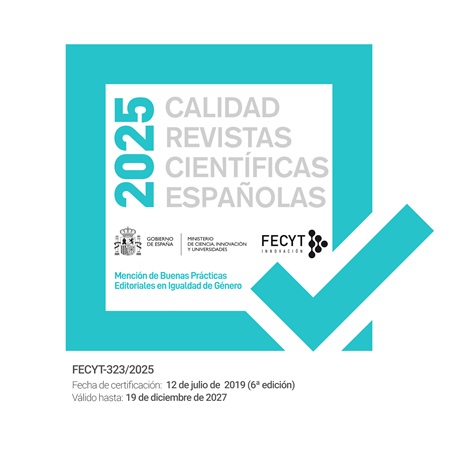Voices of the self in Nathalie Sarraute's Enfance
Abstract
If autobiography is the privileged field of the first person narrative, Nathalie Sarraute adopts in Enfance (1983) an original procedure: the dialogue. In her autobiography, the alternation between first and second person singular enable to simulate a dialogue between two instances of the self. This article entitled “Voices of the self in Nathalie Sarraute’s Enfance” aims to analyse this interior duality orchestrated by the two narrative voices where the implicit voices that have shaped the writer’s childhood – voices of the mother, the father and the stepmother Véra – emerge from the past. A polyphony of living voices, as intact as the memories evoked.
Downloads
-
Abstract456
-
PDF (Français )1747
References
Referencias bibliográficas
ALAZET, Bernard. 1990. “Nathalie Sarraute à Cerisy-la-Salle” in Revue des Sciences Humaines, 55 (i), 163-166.
ARMEL, Aliette. 1990. "Le jeu autobiographique" in Magazine Littéraire, nº 278, 28-31.
AVENDAÑO ANGUITA, Lina. 2014. “Au gré du regard (Enfance de Nathalie Sarraute)” in Thélème. Revista Complutense de Estudios Franceses, vol. 29, nº 1, 9-22.
BARTHES, Roland. 1966. "Introduction à l’analyse structurale des récits" in Communication, nº 8, 1-27.
BARTHES, Roland. 1975. Roland Barthes par Roland Barthes. Paris, Edition du Seuil (coll. Écrivains de toujours).
BEAUVOIR, Simone de. 1958. Mémoires d’une jeune fille rangée. Paris, Gallimard.
BENMUSSA, Simone. 1984. “Les paroles vives” in L’Arc, 95, 76-82.
BENMUSSA, Simone. 1987. Nathalie Sarraute, qui êtes-vous? Lyon, La Manufacture.
BENVENISTE, Emile. 1966. Problèmes de linguistique générale. Paris, Gallimard.
BUTOR, Michel. 1992. “L’usage des pronoms personnels dans le roman” in Essais sur le roman. Paris, Gallimard, 73-88.
CIXOUS, Hélène & Cécile WAJSBROT. 2016. Une autobiographie allemande. Paris, Éditions Christian Bourgois.
DURAS, Marguerite. 1984. L’Amant. Paris, Éditions de Minuit.
DURAS, Marguerite. 1987. La vie matérielle: Marguerite Duras parle à Jérôme Beaujour. Paris, P.O.L.
EAKIN, Paul John. 1992. “The Referential Aesthetic of Autobiography” in Touching the World: reference in autobiography. Princeton, Princeton University Press, 29-39.
FORRESTER, Vivianne. 1983. “Portrait de Nathalie” in Le Magazine Littéraire, nº 196, 18-24.
GORZ, André. 1958. Le Traître. Paris, Éditions du Seuil.
GOSSELIN, Monique. 1991. “Enfance de Nathalie Sarraute: les mots de la mère” in Revue des Sciences Humaines, 56 (ii), 121-142.
GOSSELIN, Monique. 1996. Monique Gosselin présente Enfance de Nathalie Sarraute. Paris, Gallimard.
GRATTON, Johnnie. 1995. “Towards narrativity: Nathalie Sarraute’s Enfance” in Forum of Modern Languages Studies, 31, 300-311.
GREEN, Julien. 1963. Partir avant le jour. Paris, Bernard Grasset.
GUERRERO, Marisa. 1993. “Las infancias de Nathalie Sarraute (A propósito de Enfance) (I): Pacto autotextual vs. Pacto autobiográfico” in Revista de Filología Francesa, 4, 89-99.
GUERRERO, Marisa. 1995. “Las infancias de Nathalie Sarraute, II (A propósito de Enfance): El texto diverso” in Revista de Filología Francesa, 6, 133-145.
JEFFERSON, Ann. 1990. “Autobiography as intertext: Barthes, Sarraute, Robbe-Grillet”, Intertextuality: theories and practice. Manchester University Press, 108-129.
KELLER, Deborah. 2004. “Autobiographie et authenticité chez Nathalie Sarraute” in Le 'Nouveau Roman' en questions, 5, Une 'Nouvelle autobiographie'?. Paris, Minard, 57-74.
LECARME, Jacques & LECARME-TABONE, Eliane. 1997. L’Autobiographie. Paris, Armand Colin/Masson.
LEJEUNE, Philippe. 1975. Le pacte autobiographique. Paris, Editions du Seuil (coll. Poétique).
LEJEUNE, Philippe. 1980. Je est un autre: l’autobiographie de la littérature aux médias. Paris, Editions du Seuil (coll. Poétique).
LEJEUNE, Philippe. 1990. “Paroles d’enfance” in Revue des Sciences Humaines, 55 (i), 23-38.
LEJEUNE, Philippe. 1998. Brouillons de soi. Paris, Editions du Seuil.
MINOGUE, Valérie. 1986. “Fragments of a childhood: Nathalie Sarraute’s Enfance” in Romance Studies, 9, 71-83.
MINOGUE, Valérie. 1988. “Nathalie Sarraute’s Enfance: from experience of language to the language of experience” in Studies in French fiction in honour of Vivienne Mylne, Robert Gibson (ed.). London, Grant & Cutler, 209-224.
O’CALLAGHAN, Raylene. 1989. “Reading Nathalie Sarraute’s Enfance: reflections on critical validity” in Romanic Review, 80 (3), 445-461.
RAMSEY, Raylene L. 1996. “Voice(s) in Nathalie Sarraute’s Enfance and the sex of the text” in The French New Autobiographies. University Press of Florida, 117-140.
RYKNER, Arnaud. 1991. Nathalie Sarraute. Les Contemporains. Paris, Seuil.
RYKNER, Arnaud. 1992. “Narcisse et les mots-miroirs (Sartre, Leiris, Sarraute autobiographes)” in The Romanic Review, vol. 83, 81-93.
SARRAUTE, Nathalie. 1983. Enfance. Paris, Gallimard.
SARTRE, Jean-Paul. 1964. Les Mots. Paris, Gallimard.
SHERINGHAM, Michael. 1993. French Autobiography: Devices and Desires. Rousseau to Perec. Oxford, Clarendon Press.
VAN ROEY-ROUX, Françoise. 1984. “Enfance de Nathalie Sarraute ou de la fiction à l’autobiographie” in Études Littéraires, 17 (ii), 273-282.
VERCIER, Bruno. 1987. “(Nouveau) Roman et Autobiographie: Enfance de Nathalie Sarraute” in Autobiography in French Literature, French Literature Series, 12, 162-171.
WEI, Keling. 2004. “Pluralité des voix et repentirs autobiographiques: une lecture d’Enfance de Nathalie Sarraute” in Études françaises, 40 (2), 101-114.
WENT-DAOUST, Yvette. 1987. “Enfance de Nathalie Sarraute ou le pouvoir de la parole” in Les Lettres Romanes, 41, 337-350.
WIESEL, Élie & François MITTÉRAND. 1995. Mémoire à deux voix. Paris, Éditions Odile Jacob.
Las obras que se publican en esta revista están sujetas a los siguientes términos:
1. El Servicio de Publicaciones de la Universidad de Murcia (la editorial) conserva los derechos patrimoniales (copyright) de las obras publicadas, y favorece y permite la reutilización de las mismas bajo la licencia de uso indicada en el punto 2.
2. Las obras se publican en la edición electrónica de la revista bajo una licencia Creative Commons Reconocimiento-NoComercial-SinObraDerivada 3.0 España (texto legal). Se pueden copiar, usar, difundir, transmitir y exponer públicamente, siempre que: i) se cite la autoría y la fuente original de su publicación (revista, editorial y URL de la obra); ii) no se usen para fines comerciales; iii) se mencione la existencia y especificaciones de esta licencia de uso.
3. Condiciones de auto-archivo. Se permite y se anima a los autores a difundir electrónicamente las versiones pre-print (versión antes de ser evaluada) y/o post-print (versión evaluada y aceptada para su publicación) de sus obras antes de su publicación, ya que favorece su circulación y difusión más temprana y con ello un posible aumento en su citación y alcance entre la comunidad académica. Color RoMEO: verde.











